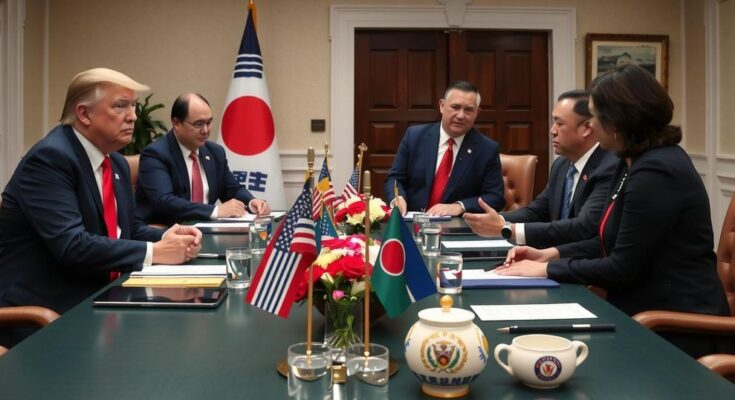Uncertainty looms over President-elect Trump’s Korea policy as he potentially weighs troop withdrawal, negotiations with Kim Jong-un, and strong ties with South Korea against the backdrop of a broader strategy toward China. Key nominees reflect a mix of hardline and diplomatic approaches, indicating that Trump may engage directly with North Korea while considering South Korea’s defense role in a changing geopolitical landscape.
Uncertainty surrounds President-elect Donald Trump’s foreign policy approach towards Korea as he enters his second term. Key considerations include whether he will withdraw U.S. troops unless South Korea significantly increases its financial contribution for their presence, engage directly with North Korean leader Kim Jong-un while overlooking Seoul, or maintain strong defense ties with South Korea as part of a broader strategy against China. Contradictory signals arise from his selection of key national security nominees, suggesting a potential hardline yet flexible stance on North Korea.
Trump’s nomination of Marco Rubio as Secretary of State and Mike Waltz as National Security Adviser highlights an internationalist perspective characterized by a robust defense buildup strategy against China. Rubio’s experience in the Senate Foreign Relations Committee positions him as a critic of North Korea, having championed stronger sanctions and a commitment to South Korea’s defense. Waltz, with his Green Beret background, mirrors this hardline sentiment toward North Korea, aligning it with a larger containment strategy against China. Yet, he has shown flexibility resembling Trump’s viewpoint on U.S. commitments to NATO and Ukraine, indicating a willingness to engage with Pyongyang potentially.
In contrast, Trump’s deputy national security adviser, Alex Wong, who played a pivotal role in the prior administration’s North Korea policy, and John Ratcliffe, Trump’s CIA nominee, may advocate a resumption of dialogue with North Korea. Ratcliffe perceives North Korea’s nuclear ambitions as both concerning and a symptom of the regime’s desire for international recognition, hinting at the possibility for concessions in exchange for sanctions relief.
Potential appointments reflecting a more engagement-oriented approach include Pete Hegseth for Secretary of Defense and Tulsi Gabbard for Director of National Intelligence. Both individuals, identified with the isolationist faction of the Republican Party, have expressed concerns over U.S. military interventions abroad. Hegseth’s stance evolved to support normalization post-Trump’s diplomatic efforts, advocating for peaceful resolutions as long as they achieve reductions in North Korea’s nuclear capabilities. Meanwhile, Gabbard critiques America’s military-industrial complex, emphasizing a non-interventionist stance.
Although Senate confirmation of Hegseth and Gabbard may face challenges, Trump may still pursue direct engagement with Kim. This willingness is further underscored by Trump’s positive remarks about his prior dealings with Kim and the recent political unrest in Seoul potentially creating favorable conditions for bypassing the South Korean government to reach an agreement with the North. While Kim has expressed intentions for a tougher stance against the U.S., such declarations may merely serve as leverage in negotiations for renewed direct talks with Trump.
The article discusses the implications of President-elect Donald Trump’s second term appointments and their potential influence on U.S.-Korea relations, particularly regarding North Korea. It analyzes the foreign policy leanings of nominated officials and the broader geopolitical considerations, namely the balance of power with China. The context for this analysis is rooted in previous administrations’ experiences with North Korea and the fluctuating nature of bilateral relations in response to regional and global dynamics, particularly concerning security commitments towards South Korea.
In conclusion, the ambiguity surrounding President-elect Trump’s approach towards Korea indicates a complex interplay of support for allies and potential direct engagement with North Korea. The diverse perspectives of his nominated officials reveal a spectrum of strategies, from hardline stances to diplomatic normalization efforts, reflecting the evolving nature of U.S. foreign policy in an increasingly multipolar global landscape. Ultimately, the outcome of these appointments could significantly influence regional stability and international relations in East Asia.
Original Source: www.koreatimes.co.kr




